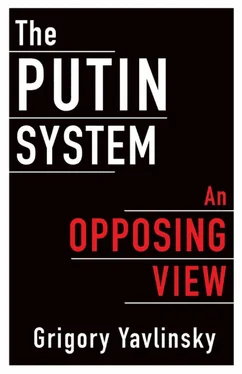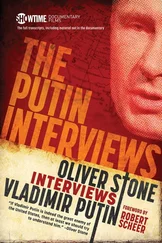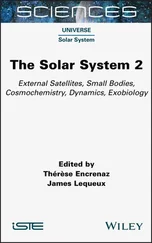What happens next is more or less clear: the institutions that are incapable of changing, including changes to close the gap between themselves and the changing sociopolitical environment, will sooner or later be unable to perform the functions that have been assigned to them. Thus, police are no longer fighting crime in earnest, intelligence agencies are no longer combating threats to national sovereignty with the same resolve as before, tax collectors are no longer as determined to pursue actual tax evaders. The courts in such a system acquire some traits of “independence”—not from the control of the supreme authorities but rather from any public control whatsoever—and by and large become commercialized. Legislative bodies pass their bills chaotically, without giving any thought to the laws’ implications or to the difficulties involved in making them work in practice. The agencies responsible for investing public funds under this system may follow any kind of logic whatsoever, except for the logic of stimulating economic growth, and most often they do whatever is convenient and serve someone’s private interest in spending public funds.
As a result of all this, the government at its highest level essentially loses the most effective tools for influence upon the situation in the country, and then its future gets determined by the forces of inertia and by various contingencies, including (and perhaps primarily) contingencies of external origin. Therefore, at a certain stage, an authoritarian government with a conservatively chauvinistic ideology and without the goal of modernization and reform is bound to become hostage to its changing environment, and this environment may either keep the government afloat for quite an extensive period or make an acute political crisis inevitable, with the regime in question being incapable of overcoming or surviving such a crisis.
During the first decade of our century, Russia passed the turning point that was mentioned earlier, the moment of choice between putting effort into modernization or building new fences and barriers on the path of political changes that might potentially threaten the stability of the authorities—and thus blocking any meaningful political development whatsoever. Today, the implications of having passed that turning point are evident to almost everyone. But, fifteen years ago, in the course of the presidential campaign of 2000, I was hardly able to persuade anyone that this kind of future was on the horizon, in spite of the very high likelihood of this course of events, given the characteristics of the oligarchical system that had been established in Russia, the personality of Boris Yeltsin’s successor, Vladimir Putin, and the means by which he was brought to power.
Certainly, all the determinants of the outcome that is with us today were also present at the time. First of all, there was the absence of a powerful class of legitimate owners of large-scale productive economic assets like those that qualify as “big business” in any Western country, a class that would be willing and able to play a significant role in defining the political future of the country. As some will object by mentioning the “oligarchs” of the 1990s and their active politicking at the time, let me say the following.
The oligarchs were not an economic class. It is true that a few dozen Russians became real owners of exorbitant personal wealth, and that they also became formal owners of one or two hundred of the most desirable economic assets of 1990s Russia, such as oil companies Yukos, Sibneft, Lukoil, and Surgutneftegas; steel mills like Mechel or NLMK; nickel and copper giant Norilsk Nickel; and so on. Yet they were unable to coalesce into an enduring class of people who would be aware of their shared interests—essentially national interests—and who would be bound together by both shared and personal interests in the development of Russia’s economy and society along the path of what is often called market democracy. They could not become such a class because they ended up in their “oligarchic” roles by accident, because they had neither a shared history nor a significant track record in business, and, finally, because there were so few of them. Members of the group were not allies sharing the same interests but rather strangers laying claims to a portion of a limited number of desirable assets— assets that the new authorities had ended up with and were now doling out to others as they saw fit.
Second, they were not viewed as legitimate property holders by the political establishment, by the population, or even by themselves. I may have written about it a thousand times, but I am prepared to reiterate the point once more: A property right is not a sealed piece of paper and is not a record made in some registry by the officials in charge. A property right is, first and foremost, the willingness of the society and its institutions to acknowledge the right of a given person to make decisions about a particular economic asset at one’s discretion, including decisions about selling it, passing it on as inheritance, or doing with it anything else that is not restricted or prohibited by law. But the oligarchs did not have this kind of broad recognition of their property rights (nor, fifteen years later, do the present-day holders of large economic assets have this). [10] Let me quote here an editorial published on August 16, 2013, by Vedomosti , Russia’s leading business paper: “The situation that we have with the ownership of large economic assets stinks. The holdings acquired in the course of privatization were not earned by their present owners. The transfer of property rights to the new owners of factories and coal mines looked like the return to a state of injustice and had a tinge of a royal grant in exchange for loyalty…. The government retains an implicit ‘golden share’ in large property holdings, especially in those that the Kremlin views as having a strategic value.”
This is precisely why the oligarchs as a group could not become the driving force for modernizing reforms—or even provide reliable support for such reforms, should the government decide to initiate them. The example of Mikhail Khodorkovsky, the businessman who supposedly advocated large-scale political and social reforms, is completely irrelevant here. His political ambitions at the beginning of the century were of a personal nature rather than reflecting the collective aspirations of an economic class. His pro-modernization rhetoric became so central to his pronouncements largely as a result of his showdown with the authorities; the cause-and-effect relationship between this rhetoric and his relations with the Kremlin is by no means as simple as some tend to believe. [11] Many observers have noted that, during the entire period of Mikhail Khodorkovsky’s imprisonment (and he explicitly confirmed it after his release), his confrontation with the government, in political terms, did not suggest—either then or today—an opposite or a fundamentally different direction for Russia’s development than the one that has been pursued by the Kremlin.
Small and medium-size business owners had even less of a chance to become a political fulcrum of an authoritarian modernization during the late 1990s, given how socially and ideologically disparate and politically disorganized they were.
On the other hand, the central government bureaucracy was somewhat better prepared to assume that role. And, paradoxical as it may seem, it did for a quite a while sustain the possibility of a turn of the authoritarian system toward more recognition of society’s interests and needs. However, in the end, the “modernizer” faction turned out to be too politically weak to influence the policies of the Kremlin in a fundamental way. As a result, these policies ended up being nearly the opposite of those advocated by the modernizers in the bureaucracy, and representatives of this stripe who opted to stay aboard ended up being hostages of the course of action that was chosen by Vladimir Putin.
Читать дальше












